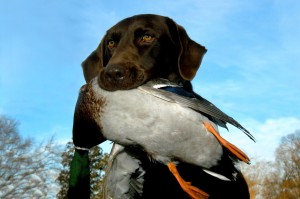 Your last Missouri duck hunting trip was a bust and you want to make sure this year is much better. The first step was in booking a guided duck hunting trip to learn some better hunting techniques from the guys that have been duck hunting in Missouri for decades. That was a great decision, but your prep work for the upcoming season is just beginning. If you are spending money on a guided duck hunting trip, you also need to get your young pup ready for hunting in real life conditions.
Your last Missouri duck hunting trip was a bust and you want to make sure this year is much better. The first step was in booking a guided duck hunting trip to learn some better hunting techniques from the guys that have been duck hunting in Missouri for decades. That was a great decision, but your prep work for the upcoming season is just beginning. If you are spending money on a guided duck hunting trip, you also need to get your young pup ready for hunting in real life conditions.
Don't Fall for the Decoy
Something that is very common among young retrievers is picking up decoys, sticks, or some other random object when they are out on a hunt. This is not the dog's fault, but the fault of the owner for not training them properly. The good news is that this is a fairly easy fix.
Set up decoys as well as some random sticks in your yard. Start walking the dog through the decoys. If the dog goes for the decoys or sticks, you need to let the dog know these are not to be touched. However, do not overcorrect or the dog can become afraid of the decoys. Be subtle, but let the dog know these items are not what it is after during a retrieve.
The next step would be to put your bumper in among the decoys. Again, walk the dog through and allow it to retrieve the dummy while not going after the decoys or sticks you have placed throughout the spread. If the dog goes after a decoy or stick, do your correction and start the drill over again. The dog needs to be comfortable working within the spread while knowing exactly what it is looking to retrieve. Repeat until the dog does it perfect every time.
If you hunt from a boat, introduce the boat and water into the training. Take the boat out to a local shallow water spot and set up decoys. Have someone place the dummy and then let the dog practice getting in and out of the boat as well as retrieving.
Introduce Calls and Gun Fire Before the First Hunt
In a guided duck hunting trip, your dog is going to be exposed to multiple calls as well as a significant amount of live firing. Understandably, a dog that has not been introduced to this can become quite startled. You need to allow the dog to experience these situations before it goes out for the first time.
A call can cause quite a stir in a dog when they hear it for the first time. It can also cause quite a bit of confusion. Obviously, your pup going berserk in the middle of a hunt is not a good situation. Practice your calls around the dog so it gets used to these noises. You can even work in the calls while doing your decoy drills so it is closer to what the dog will experience during the guided duck hunting trip.
The dog also needs to be comfortable around shooting. First, practice firing in the general vicinity of the dog. Gradually work close to the dog so the dog becomes comfortable with firing directly over them, just as they will experience when hunting. You need to get to the point where you are able to fire multiple shots with the dog as stiff as a stone by your side.
Finally, the dog needs to learn not to retrieve until you give the signal. Younger dogs can get excited and take off as soon as they see the bird coming down. This can be dangerous, especially when other hunters are around. Again, use your decoy spreads to practice and if the dog jumps too early and your correction is not working, introduce a cage or use a rope with a slipknot to hold the dog until you give the signal. The more "real-scenario" practicing you do with your new pup, the better the dog will be when it is time to hunt for real.

